Open on Evenings & Holidays! Extended And Flexible Hours!
* DNA Testing for Immigration
* Paternity Testing
* Deceased Paternity
* Forensic Testing & Much More!
Open on Evenings & Holidays! Extended And Flexible Hours!
* DNA Testing for Immigration
* Paternity Testing
* Deceased Paternity
* Forensic Testing & Much More!
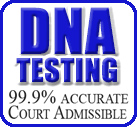
AB DNA Testing Services
Phone: 718-701-0292
We offer New York’s BEST AND MOST AFFORDABLE DNA TESTING with a full range of services to verify family relationships.
We specialize in the following types of DNA tests:
• Paternity • Maternity • Grand-parenting • Sibling Relationship • Biological Relationship Studies • Twin Studies • Deceased Paternity • Forensic Testing • Child Identity Testing • Family Tree and Genealogy Testing
* EVEN LOWER PRICE THAN HOME DNA KITS.
* NO HIDDEN COSTS – Collection kits, photography, and fingerprinting all included.
* 99.9% (OR GREATER) ACCURACY.
* FINAL RESULTS ARE PRESENTED IN A NOTARIZED DOCUMENT IN A CLEAR AND CONCISE FORM.
* ALL RESULTS ARE COURT ADMISSIBLE.
* OVER 15 YEARS EXPERIENCE.
* NO REFERRALS NECESSARY!
* FAST AND PAINLESS SAMPLE COLLECTIONS, USING BUCCAL (Mouth) SWABS.
* SPANISH, PORTUGUESE, FRENCH AND CREOLE SPOKEN.
* PLEASE SEE TRANSLATIONS OF OUR SERVICES IN: SPANISH, BENGALI, URDU, CHINESE AND NEPALESE!
Located In Woodside Queens, easily reachable from all boroughs (Queens, Manhattan, Brooklyn, Bronx and Staten Island), Westchester, Nassau and Suffolk.
We can also schedule DNA tests at our network of collection sites throughout New York city.
Call us. We have found that in many cases, our personalized service can overturn your denial. We will call the passport office or immigration dept. for you and plead your case over phone verbally.
90% of time they will revoke your denial, as long as you get the required information to them quickly.
AB DNA TESTING SERVICES
AB DNA Testing Services © |
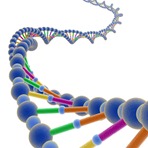 |
718-701-0292 We are open on evenings & holidays! |
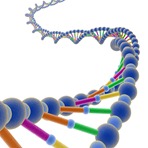 |
Legal Paternity Test: $349
NYS compliant testing only. NO HIDDEN COSTS OR EXTRA FEES.
We do not provide prenatal DNA testing in-house. If you need prenatal testing, we can refer you to a provider we’ve worked with previously:
Prenatal DNA Testing NYC.
AB DNA Testing Services offers a broad range of DNA testing options using certified, accredited laboratories and verified collection procedures.
 When and why is paternity and maternity DNA testing important? DNA testing has become a reliable and essential resource for confirming biological relationships. Whether it’s for legal clarity, immigration requirements, or personal peace of mind, paternity and maternity DNA testing provides scientific answers to questions that once required years of uncertainty or guesswork. These tests play a vital role in a wide range of situations, from establishing parental rights to resolving inheritance disputes. In this article, we’ll explore why these tests are important, how they work, and how to ensure you’re getting accurate and legally recognized results.
When and why is paternity and maternity DNA testing important? DNA testing has become a reliable and essential resource for confirming biological relationships. Whether it’s for legal clarity, immigration requirements, or personal peace of mind, paternity and maternity DNA testing provides scientific answers to questions that once required years of uncertainty or guesswork. These tests play a vital role in a wide range of situations, from establishing parental rights to resolving inheritance disputes. In this article, we’ll explore why these tests are important, how they work, and how to ensure you’re getting accurate and legally recognized results.
Paternity DNA testing determines whether a man is the biological father of a child, while maternity DNA testing confirms a woman’s biological relationship with a child. Both tests use a simple and non-invasive sample collection — typically a cheek swab — from the individuals being tested. The collected DNA is analyzed and compared to determine if there is a genetic match.
These tests serve a range of personal, legal, and medical purposes. Here are some of the key reasons people choose to have a paternity or maternity test:
In immigration cases, proving a biological relationship between a U.S. citizen or permanent resident and a foreign-born child or parent may be required. U.S. embassies and USCIS accept only DNA test results from accredited laboratories for legal immigration applications.
In cases of adoption, maternity or paternity testing may be used to confirm biological relationships. It’s also helpful in family reunification efforts when long-lost or separated family members want to confirm kinship.
Sometimes, individuals seek paternity or maternity testing for personal reasons — to remove doubt, bring closure, or build emotional bonds with family members. Knowing the truth can foster stronger family connections and reduce emotional stress.
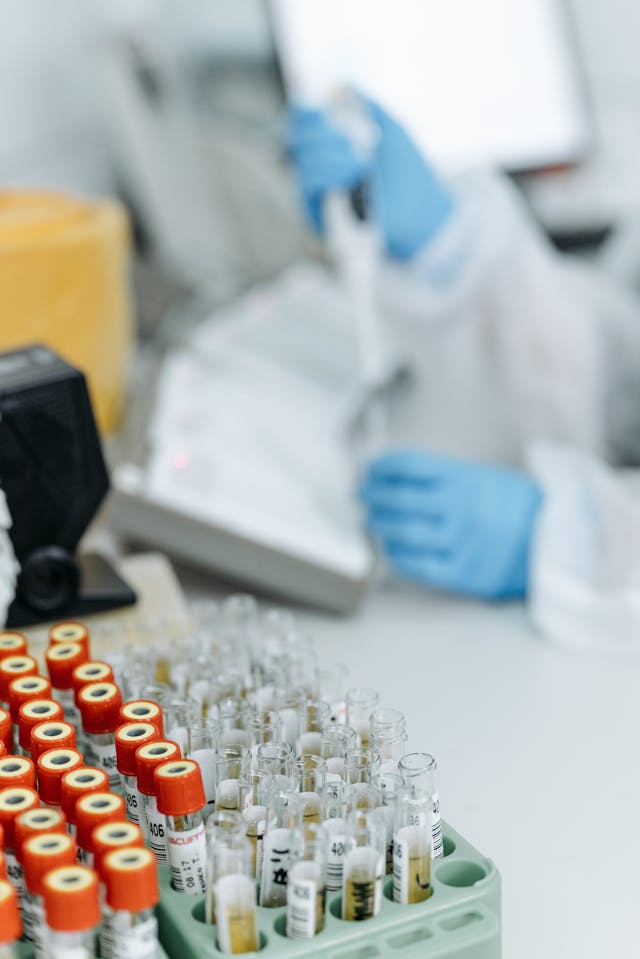 DNA testing for paternity or maternity is simple and stress-free:
DNA testing for paternity or maternity is simple and stress-free:
It’s important to distinguish between legal DNA testing and peace-of-mind testing:
Accuracy, reliability, and confidentiality matter when choosing a DNA testing service. Be sure to choose a provider that is:
At AB DNA Testing Services in Queens, we provide fast, confidential, and court-admissible paternity and maternity testing for families, legal cases, and immigration purposes. Our experienced staff ensures the process is easy, supportive, and secure from start to finish.
Whether you need answers for legal, personal, or immigration reasons, AB DNA Testing Services is here to help you uncover the truth with confidence and care.
AB DNA Testing Services ©
Phone: 718-701-0292
Call now to schedule your consultation. We’re here to provide clarity, comfort, and certified DNA testing you can trust.
So, are you the father? A DNA test will prove it. It is not uncommon for men to abandon their partner after an unwanted pregnancy. Believe it or not, this situation is a harsh reality of the world, and shows the unpredictable nature of humans. A child born into a world without their father lives a good chunk of their life in confusion.
Before the advancements of DNA tests, people found it impossible to track their fathers. Times have changed – the accuracy and collective database of the genetic sequencing now makes it possible to find out who the father is. .
If you suspect a certain individual to be your father, it is best to rely on a DNA test for the best and most accurate answer.
DNA or Deoxyribonucleic Acid is a molecule, or a protein, located inside our cell. More specifically, you can find it inside the nucleus of our cell. It consists of genetic material, or information of your phenotypical features. .
It is the primary building block of all living things, making them what they are. It consists of nucleotides that have a sugar, phosphate, and nitrogenous base on each end. Two sets of nucleotides, that have a hydrogen bond with each of their nitrogenous base, make up the complete structure of the DNA.
In an illustrative representation, the DNA structure looks similar to a spiraling ladder; most people refer to the structure by the name of double helix. A closer study of the DNA molecule helps scientists identify the personality, physical features, and characteristics of a person.
A DNA molecule will have one of the four nitrogenous bases, A, G, T, and C. These bases bind with each other to form a genetic sequence. This sequence or genetic code represents a set of instructions that determine certain characteristics in a person.
In terms of identifying a paternal relationship, experts can easily study your genetic code and the suspected father’s code and look for matches within the two DNA molecules.
Your genetic profile or genetic sequencing will be similar to the father’s. The accuracy of DNA tests in the case of paternal identification is astoundingly accurate. So much so, that DNA reports from accredited labs are also applicable for legal matters and to resolve court issues.
Now, consider that you do not have any suspects that you can test to confirm their fatherhood towards you. The technological advancement of data storing and record keeping can help you find the closest matches of your DNA and contact them for confrontational purposes.
The first thing that you should be careful of before you take the DNA test is that you should make sure that you visit a LAB that has an AABB accreditation. This is the highest form of certification that a DNA test lab gets. It makes their reports eligible for governmental use and legal issues.
An accredited lab follow all the protocols of a well-manage and professional lab. Whether it is the accuracy of the results, or the sanitation of the facility, an AABB lab is always on top of it. Moreover, to maintain accreditation, a lab has to keep their procedures up advanced and on par with the latest technology, otherwise, they can lose this profession certification.
Consider this, you can get your DNA test and ask the lab to run all the matches in their database and look for possible matches. The chance that you find a perfect match, indicative of your father’s DNA is very low. However, you can still find close matches of potentially, your paternal relatives.
Tracking them down and contacting them with the little information that you have of your father may hint you towards some real answers and possibly lead you to your biological father. In the best-case scenario, the database will have the genetic information of your biological father. If in case it does not, you can always make analysis of your family tree.
Finding your father starts from the missing pieces in your family tree. DNA tests can help you solve the family tree by allowing you the information of your paternal relatives. If you get their information, it is important that you set a meeting with them as well.
Not knowing about your father can influence your life in the worst of ways. It leaves you with an unfulfilled feeling and could result in mental health issues. Visit our facility in New York if you share this sentiment.
AB DNA testing Services has accreditation with the best organizations. Contact us now at 718-701-0292 or visit our website for more information.
If you’re asking yourself “Is he the father?”, Then you should take a DNA test. Every day, people find their long lost family members or figure out that they were not living with their biological father. After knowing about their stories, you may be wondering how you can find your biological father if you never knew them.
No matter what test you go for, you will end up finding some of your relatives. You need to take various tests so that you can get closer and closer to finding your father. You can also upload your DNA data to a database, which helps people find their relatives. The database will allow various people to find you, and you to find them.
In this article, you will learn how you can find your ancestry or your father with a DNA test. Even if your parents are not available in your database, you can still find them.
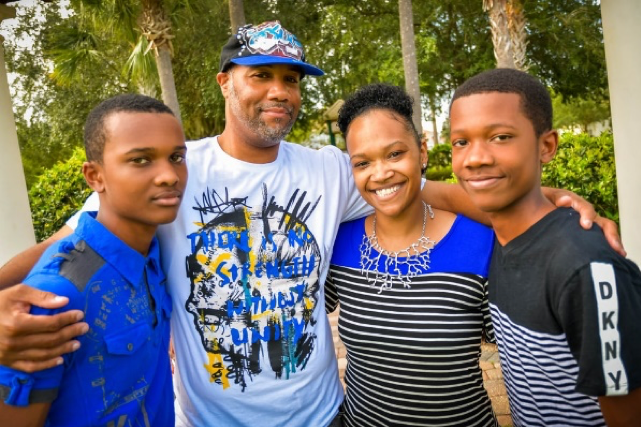
(Source)
The first and the most obvious thing to do is take a DNA test to find your biological family. You can visit any AABB accredited laboratory, such as AB DNA Test. Even if your father did not take the test yet, but their close relatives may have. You can find those relatives and connect with your biological father.
When you find the results of your test, you can publish that on the database. If you already know your family tree, you can share that information with a family tree database. Through this database, your other biological relatives can find you while looking for their ancestors.
Finding your DNA match is not as difficult a task as it seems. When you are done with your DNA test, you need to upload that information to the database. That database will analyze the matches and will show you all the biological relatives you have. The more your DNA matches with the other person, the more closely they relate to you. If you cannot find any close relationship, you should wait to test and search for themselves. This way, they will find you as their biological relative and look for you.
Once you receive all the DNA matches, you need to start with the close ones and check their family trees. If your relative has uploaded their family tree on the database, you can view every member and relate it with them. If they have no family tree, then you can contact them and ask yourself.
Once you find out your DNA matches, you will receive their Names, surnames, and any other details they have mentioned. If you can find their contact number, you can call them and set up a meeting. Some people hesitate to meet their biological relatives as they have never seen them. That is normal, but you should consider how happy and satisfied you will feel once you find your biological parents. Furthermore, DNA testing to find a father is very common now. So if you will meet your biological relatives, you will feel happy rather than awkward.
After you contact your biological relatives, you can set up a meeting to get to know them. You can also ask for further details about your parents, ancestors, and family tree. Sometimes, your relatives are far from your location or maybe in another country. If you are unable to visit them, you can discuss with them about your father on call. While they might not mind if you ask them about their details, some might be a little more hesitant. So be a little careful when asking any questions.
Once you find out your possible ancestors, you need to investigate deeply and find more information about your relationship. Now you can predict your future by asking for their family tree. For instance, the ancestor of your 2nd cousin would be your great grandparents. Now you can add the spot in your great grandparents in your family tree. After knowing the exact position in your family tree, you can adjust them.
After knowing the ancestor, you can find their descendants by generation, identify their children, and so on till the present. Now keep going until you know the name of your father. Sometimes vague information from your adoption files can also help. You have to connect the pieces of the puzzle that is your family tree one at a time.
When you are tracing your family members, you can find potential relatives such as your father, mother, cousins, uncles, aunts, grandparents. Even if you are not sure about their relationship with you, you can talk to them and find out. This way, you can find the missing gaps in your family tree. You should not hesitate to talk to them, since they too want to find their relatives.

(Source)
To prove your father, you need to take a DNA test.
Contact the top DNA testing lab in NYC.
AB DNA Testing
63-11 Queens Boulevard
Woodside NY 11377
718-701-0292
What is parental DNA testing? The most important and popular use of DNA testing is the confirmation of the child’s biological parents. The confirmation of the child’s biological parents is crucial for clearing away doubts regarding the child’s birth. It is also very decisive for children’s rights and custody during conflicts or divorce between the parents.
Although other biological identification tests were in use before the advent of DNA testing process, but blood typing, HLA test, and serological testing were less accurate for determining biological relations. After the introduction of DNA testing during 80s, scientists discovered the potential of DNA testing for identifying biological relationships.
DNA is the unique genetic make-up of an individual. When a baby comes in this world, the mother and father pass on half of their DNA to the baby. The baby’s DNA is a mix of the parent’s DNA with a unique sequence.
For the parental DNA testing process, we collect a small buccal sample of an individual, and then we obtain and examine the DNA sequence. We then compare the DNA from the samples of the alleged father or mother. The 0% matching gives a negative result. For a positive result, the probability between the parent and the child should be 99.9% or greater.
Although the DNA testing process is highly advanced and we perform it very carefully, there are possibilities of false results. DNA tests from proper and certified labs and research centers have hardly any chances of false results. But the following situations can alter the results of a paternal DNA test.
If the DNA paternity test is done for a legal case, either of the parties might want to get hold of the test result and tamper it. Tampering test results is nearly impossible under strict regulations and when a proper and certified lab is performing the test. However, if any party can get hold of the result, they can tamper it for their gain.
Deliberate fraud is not the only reason for false positive and negative results. Errors by the lab during the test process can also give inaccurate results. If you suspect that your test result is incorrect, this might be the reason, and you should have another test.
Even if the candidates are have a relation, the DNA test will not give a 99% probability in usual cases. However, in some instances, it is possible. If the candidate has a relation to the kid, then the lab should conduct the test very carefully, and give results double-checking to be on the safe side.
DNA mutations are alterations in the DNA sequence. They happen spontaneously throughout life and cause no interference in the DNA test result. But if a sperm contains a strand of DNA with mutation, the chances are that paternity test can give false negative result for the father and child. Radioactive rays. especially from chemotherapy, and other sources can induce mutations in DNA. In such cases, using the DNA from the mother can increase the paternity index and give correct test results.
Paternal DNA tests are important when the rights and duties of parents are an issue, and the child’s paternity is in doubt. Getting paternity tests from a proper and certifies lab is necessary to cancel out any chances of error. AABB DNA Testing offers a full range of services to validate family relations. AAB DNA Testing is certified and has court-admissible DNA tests.
Contact us at 718-701-0292 to get the best DNA testing in NYC.
So, the court is making you take a DNA test for paternity. Why? For starters, some people do not know if they are the father of the child in question. The court may need this information for legal matters. Often in these circumstances, the mother and alleged father disagree about paternity and need an official test to prove paternity.
If the mother and father agree about paternity, they are able to file an Acknowledgement of Paternity, which is a legal document stating the paternity of the child. If necessary, this document can be revoked if you later change your mind about paternity.
These paternity tests can help the court decide about things such as custody, visitation rights, and mandatory payment of child support. Sometimes paternity tests are used for immigration purposes. Paternity tests are often issued be the Office of the Attorney General of your state.
For a court-ordered paternity test, you will need to visit an AABB licensed DNA testing lab, like our lab. To obtain the DNA sample, we will collect buccal cells, or cheek cells, from inside your cheek using a cheek swab made of cotton. We will then compare your DNA to the DNA of the child.
Each person has a unique set of DNA. All of a person’s DNA put together is called a genome. When people are related, their genomes are more similar to each other than when they are not related. When we compare the genomes of multiple people side-by-side, we are able to see how similar the genomes are. This comparison is called DNA profiling or Genetic Fingerprinting, and is the same process used in criminal investigations to see if someone’s fingerprint or hair matches the genome of the suspect. This genome comparison will give a percentage result.
This percentage represents the probability that the two people- in this case a child and parent- are related. If the probability is 0% then they are not related. If they are related, the probability may be as high as 99.99%.
So, if you receive a paternity probability of 99.99%, then you are the biological father of the child. However, if the paternity probability is much lower, or even 0%, then you are not the biological father of the child. These tests are extremely accurate.
You will receive your results about 4 – 6 weeks after the paternity test. After these results are sent back from our lab, the court will be able to finalize your paternity.
A Legal paternity test is more expensive than a Non-Legal paternity test because it must be done at a DNA testing lab, such as our lab. They can cost between $100-$500. Many at-home DNA tests cost much less than $100, but these tests will not suffice for legal matters and the court will not accept them as valid DNA evidence. Therefore, if ordered to take a paternity test by the court, you must take a Legal paternity test in an accredited lab.
Contact us today to schedule a paternity test appointment with the best DNA testing lab in NYC.
AB DNA Testing
63-11 Queens Boulevard
Woodside NY 11377
718-701-0292
———
References:
https://en.wikipedia.org/wiki/DNA_paternity_testing
https://www.texasattorneygeneral.gov/child-support/paternity/court-ordered-paternity
https://www.texasattorneygeneral.gov/child-support/paternity/acknowledgement-paternity-aop
There are many reasons someone may desire a maternity or paternity test. These are DNA tests used to confirm a child’s biological parents, either for personal knowledge or for legal reasons. These DNA tests are extremely accurate.
We typically perform maternity tests for people who need a legal confirmation of maternity for immigration, citizenship, or passport purposes. This test can also be performed for other legal reasons, such as confirmation of Native American Tribal
Membership. However, we also perform maternity tests for other reasons, including for non-legal reasons. An example of a maternity test performed for a non-legal reason would be a grown child who, after being adopted, wants to confirm who their biological mother is. Or perhaps there is a mix-up in the maternity ward at a hospital and the doctors need to confirm the mother of a child. In this case, they would seek a maternity test.
Another reason someone might seek a maternity test is in the case of surrogacy. Surrogacy is the process in which a man and woman use in-vitro fertilization to have their fertilized embryos placed in another woman’s uterus so that she will grow and birth the child for that couple. This process does not always work, and, in some cases, the surrogate mother will become pregnant with her own child instead. A maternity test would be needed to confirm if the child belongs to the couple or the surrogate mother.
As with maternity tests, most paternity tests at our laboratory are performed for immigration purposes. However, we also perform many paternity tests to establish legal parenthood. These paternity tests can help the court decide about things such as custody, visitation rights, and mandatory payment of child support. Sometimes we perform paternity tests because a mother and/or her child would simply like to know who the father is for their own personal information.
Whatever your reason for seeking either a maternity or paternity test, it is important to know how these tests work.
When we perform a maternity or paternity test, we usually collect buccal cells (cheek cells) from inside a person’s cheek using a cheek swab made of cotton. We will need swab samples from both the child and the alleged father and/or mother to be tested. Once we have the cell samples, we are able to perform the DNA test for paternity or maternity.
Each person has a unique set of DNA. All of a person’s DNA put together is called a genome. When people are related, their genomes are more similar to each other than when they are not related. When we compare the genomes of multiple people, we are able to see how similar the genomes are. This comparison is called DNA profiling or Genetic Fingerprinting. This genome comparison will give a percentage result.
This percentage represents the probability that the two people- in this case a child and parent- are related. If the probability is 0% then they are not related. If they are related, the probability may be as high as 99.99%.
Do you want to confirm paternity or maternity? Contact us today at 718-701-0292 to schedule a paternity test or maternity test appointment with the best DNA testing lab in NYC.
References:
There are many reasons someone may want a paternity test. Perhaps a mother would like to confirm the father of her child. Or perhaps a father would like to confirm a child as his own. Or a grown child may want to know who his or her father really is. Whatever your reason for seeking a paternity test, it is important to understand how they work.
When we perform a paternity test, we usually collect buccal cells, or cheek cells, from inside a person’s cheek using a cheek swab made of cotton. We will need swab samples from both the child and the alleged father to be tested.
In some cases, people want a paternity test done before the child is born. In this case, we can refer you to Genetic specialists that will perform an amniocentesis procedure in which amniotic fluid is taken from the womb and used as a sample. However, there is a small risk of miscarriage when performing this procedure.
There is also a new way to perform a paternity test before the child is born, without a risk of miscarriage. Because some DNA from the fetus floats around in the mother’s bloodstream, we can take some of her blood and use that as the sample for the child.
After we have the DNA sample either from cheek cells, amniotic fluid, or blood, we can perform the DNA test.
Each person has a unique set of DNA. All of a person’s DNA put together is called a genome. When people are related, their genomes are more similar to each other than when they are not related.
When we compare the genomes of multiple people, we are able to see how similar the genomes are. This comparison is called DNA profiling or Genetic Fingerprinting, and is the same process used in criminal investigations to see if someone’s fingerprint or hair matches the genome of the suspect. For a paternity test with a female child, we use this method to compare the two genomes.
However, in performing a paternity test for a male child, this process of comparison becomes much easier. Instead of using the entire genome, we are able to compare just the Y chromosome from the child and the potential father because male children inherit their father’s Y chromosome.
After we perform the paternity test, you will receive a percentage result. This percentage represents the probability that the child and potential father are related. If the probability is 0% then they are not related. If they are related, the probability may be as high as 99.99%. These paternity tests are very accurate.
The cost of a paternity test is based on the type of paternity test you choose. There are two types: Legal paternity tests and Non-Legal paternity tests. Legal paternity tests are used in court to establish things such as mandatory child support. Non-Legal paternity tests are used for your own personal information. While Legal Paternity tests can cost between $100 and $500, Non-Legal paternity tests can be done for as little as $15 because they can be done from home. A Legal paternity test is more expensive because it must be done at an AABB-accredited DNA testing lab, such as our lab.
Contact us today to schedule a paternity test appointment with the best DNA testing lab in NYC.
References:
https://en.wikipedia.org/wiki/DNA_paternity_testing
https://www.verywellfamily.com/about-paternity-tests-1270746
https://dnacenter.com/blog/are-home-paternity-tests-accurate/
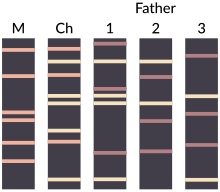 Paternity DNA testing is carried out in order to determine who the biological father of a child is. If you have doubts as to who your biological father is or you want to determine whether you could be the biological father of a child, this type of test can prove invaluable. There are many reasons why people decide that they need to have this type of test carried out and in many cases it is simply because they want to know who their father or child is. However, there are also other reasons why people have this type of test performed.
Paternity DNA testing is carried out in order to determine who the biological father of a child is. If you have doubts as to who your biological father is or you want to determine whether you could be the biological father of a child, this type of test can prove invaluable. There are many reasons why people decide that they need to have this type of test carried out and in many cases it is simply because they want to know who their father or child is. However, there are also other reasons why people have this type of test performed.
A paternity DNA test is a pretty simple process and one that is used regularly. When we are born we inherit half of our DNA from our father so carrying out a DNA test can determine whether part of a child’s DNA is a match with the assumed father that is also being tested. This then provides you with conclusive information as to the identity of the biological father.
There are various reasons why you may need to have a paternity test carried out to find out about your biological father or child. Of course, for many it is simply a case of wanting to know once and for all who their biological father or child is, as this is not something that anyone wants to have doubts about. However, some of the other reasons why people decide to have a paternity DNA test include:
By using paternity testing experts to find out this information, you can benefit from greater peace of mind and conclusive results. When you use a reputable facility, the results are checked and verified to ensure you never have to worry about inaccuracies or even mixed up results.
If you need to have a paternity DNA test carried out for any reasons, you need to ensure you go to a reputable facility with experience staff to carry out the testing. You can do this by contacting one of the leading DNA testing centers in NYC.
A paternity-DNA test is performed to discover whether an individual is the biological father of a particular child or not. The process requires a small sample of bodily fluids or tissue extracted from both the boy and the potential father. It is also considered as the genetic fingerprint that forms our chromosomes and genes. Moreover, did you know that half the DNA of your mother and father is what contributed to your DNA? A paternity test can determine the biological relationship between the baby and the father – which also make it important that you have it performed in DNA testing in NYC.
Performing a paternity test is technically easy. The cells in our body contain most of our DNA and a testing sample can be taken from multiple bodily sources. A DNA test is commonly performed through buccal cells – which are present inside the cheek of your mouth. To conduct the cheek cell test, the sample is collected by rubbing a cotton swab inside the cheek of the father’s mouth. The sample later goes to a laboratory for further examining. After the examination of a number of particular DNA series, it is identified whether the DNA samples of the baby and the father match or not.
Also, the paternity can be performed through two methods before the birth of the baby i.e.
In invasive paternity testing, the DNA test can be performed through two methods – chorionic villus sampling and amniocentesis. However, it is important for you to select the best DNA testing center in NYC.
The chorionic villus sampling (CVS) is performed between 11 and 13 weeks of pregnancy only. The procedure of the test includes examining a tiny tissue sample taken from the placenta.
The amniocentesis is usually conducted in 16 and 22 weeks during pregnancy. In the process, a needle passes through the abdomen of the mother to collect a sample of amniotic fluid, which is basically the water around the baby, which also what contains its cell.
These paternity tests are accurate and recommended because the samples are directly taken from the fetus. Apart from this, there is a small risk of miscarriage associated with both testing processes that is one percent CVS and 0.5% for amniocentesis. Therefore, it is suggested to consult only a genetic specialist (maternal-fetal medicine specialist) for the performance of these procedures.
The advancement in genetic testing has allowed experts to discover the biological father of the baby before the child is born. In non-invasive paternity method, a tiny amount of fetal DNA (cffDNA) is taken, which is available in the woman’s blood during pregnancy. The results of this procedure are accurate and there is not any risk of miscarriage associated with it. According to several studies, cffDNA can be performed only in seven weeks of gestation. It is noteworthy here that the amount of cffDNA increases as pregnancy proceeds.
Apart from this, DNA tests are also essential for legal requirements i.e. child support, inheritance, social welfare benefits or adoption process. And to get accurate DNA test results, contact us now and book an appointment with the most trusted DNA testing center in New York City.
Call us at 718-701-0292 to schedule an appointment with the top DNA testing center in NYC.
Paternity DNA testing is performed to clear doubts regarding a biological relationship between a father and son. People opt for it due to its accuracy. You can perform Paternity DNA test at home whereas a third party conducts the legal testing. However, the same technique is applied to analyze the taken samples. It is essential to learn the difference between these two testing methods as they carry sensitive information. It is even better to refer to a trustworthy DNA testing in New York.
Home paternity testing is also called “peace of mind paternity test.” It clears doubt and is an ideal way to discover the biological relationship between possible father and son. You can perform testing without hurting your privacy. And after results, you can decide whether this matter should be taken a step further or not.
The process is simple, and all you have to do is order a “testing kit” via online or telephone, and it will arrive at your doorstep. This testing doesn’t require any evidence of participant’s identity, but consent for samples analysis would be required. The results of home testing will issue via e-mail. However, a hard copy can be sent on request of the participant. It is noteworthy here that these results are for your peace of mind and personal knowledge and do not serve any legal purpose.
A legal paternity test is carried out by the third party that is also called court-admissible paternity test. It serves several legal matters, i.e., name changing on a birth certificate, percentage issues, or even for immigration petitions.
The participants who opt for legal paternity DNA test would require filling out application forms that include all the required contact details. It might include name and address of a doctor who is assigned to take samples – this doctor works as a sampler and holds huge responsibility during the entire process. The sampler ensures the “chain of custody” that is a requirement in legal DNA testing.
This is a little time taking the process as it involves steps above to ensure the authenticity of the results. There is no chance of fraud associated with it as the samples are always taken in the presence of a third party. Home paternity DNA testing is much simpler than this method.
These tests are sensitive and to get valid results, schedule an appointment right now with the best DNA testing center in New York.
Call us at 718-701-0292 to schedule an appointment with the top DNA testing center in NYC.